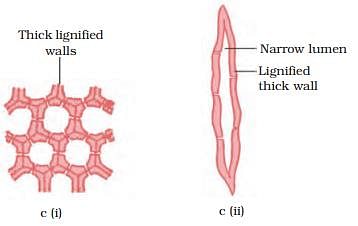Test: Tissue- 1 - Class 9 MCQ
20 Questions MCQ Test Science Class 9 - Test: Tissue- 1
Which of the following statements about meristematic tissue are correct?
(i) Consists of cells that are very active, with dense cytoplasm, thin cellulose walls, and prominent nuclei.
(ii) Lacks vacuoles because they are involved in rapid cell division.
(iii) Is classified into apical, lateral, and intercalary based on their location.
(iv) Is responsible for the permanent shape, size, and function of cells.
(i) Consists of cells that are very active, with dense cytoplasm, thin cellulose walls, and prominent nuclei.
(ii) Lacks vacuoles because they are involved in rapid cell division.
(iii) Is classified into apical, lateral, and intercalary based on their location.
(iv) Is responsible for the permanent shape, size, and function of cells.
| 1 Crore+ students have signed up on EduRev. Have you? Download the App |
Simple squamous epithelial cells are extremely thin and flat, forming a delicate lining in areas such as the ____.
Lignified or thickened cell wall is a characteristic feature of______.
Cork cells are made impervious to water and gases by the presence of_______.
Assertion (A): Muscular tissue consists of elongated cells responsible for movement in our body.
Reason (R): Muscles contain special proteins called contractile proteins, which contract and relax to cause movement.
Both collenchyma and sclerenchyma give mechanical strength to plants; but the former differs from the latter, in_______.
Assertion (A): Meristematic tissues in plants are primarily responsible for plant growth.
Reason (R): Meristematic tissues contain actively dividing cells that lead to an increase in length and girth of plant organs.
Assertion (A): Parenchyma tissue generally stores food in plants.
Reason (R): Collenchyma tissue provides flexibility to various parts of a plant.
|
87 videos|369 docs|67 tests
|


















